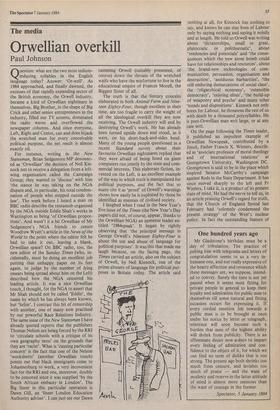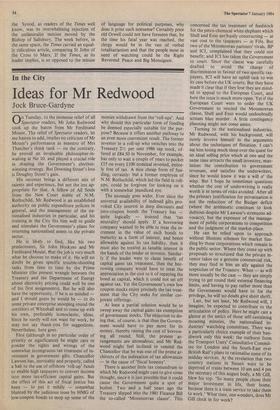The media
Orwellian overkill
Paul Johnson
uestion: what are the two most tedium- inducing syllables in the English lauguage today? Answer: 'Or-well'. As 1984 approached, and finally dawned, the excesses of that rapidly expanding sector of the British economy, the Orwell industry, became a kind of Orwellian nightmare in themselves. Big Brother, in the shape of Big Crick and other senior entrepreneurs in the industry, filled our TV screens, dominated the radio waves and overflowed the newspaper columns. And since everyone, Left, Right and Centre, can and does hijack the wretched man for every conceivable political purpose, the net result is almost exactly nil.
For instance, writing in the New Statesman, Brian Sedgemore MP denounc- ed as 'Orwellian' the decision of Neil Kin- nock not to receive a delegation from a left- wing organisation called the Campaign Group; they wanted to 'discuss' with him 'the stance he was taking on the NGA dispute and, in particular, his total condem- nation of people who stepped outside the law'. The week before I heard a man on BBC radio describe the rentamob organised by the NGA outside Eddie Shah's works in Warrington as being 'of Orwellian propor- tions'. And wasn't it a bit Orwellian of Mr Sedgemore's NGA friends to censor Woodrow Wyatt's article in the News of the World to the point where the editor felt he had to take it out, leaving a blank, Orwellian space? On BBC radio, too, the new editor of the Sunday Times (who, in- cidentally, must be doing an excellent job putting that unhappy paper on its feet again, to judge by the number of lying smears being spread about him on the Left) described how the NGA censored his leading article. It was a nice Orwellian touch, I thought, for the NGA to assert that Mr Shah should not be called 'Eddie', the name by which he has always been known, but `Selim'. I contrast this bit of censorship with another, one of many now practised by our powerful Race Relations Industry. The same issue of the New Statesman I have already quoted reports that the publishers Thomas Nelson are being forced by the RRI to 'circulate schools with a critique of its own geography texts' on the grounds that they are 'racist'. What is 'causing particular concern' is the fact that one of the Nelson 'worksheets' (another Orwellian touch) points out that black immigrants come to Johannesburg to work, a very incovenient fact for the RRI and one, moreover, doubly to be censored since it was supplied 'by the South African embassy in London'. The Big Sister in this particular operation is Dawn Gill, an 'Inner London Education Authority adviser'. I can just see our Dawn
ramming Orwell (suitably presented, of course) down the throats of the wretched waifs who have the misfortune to live in the educational empire of Frances Morell, the Biggest Sister of all.
The truth is that the literary conceits elaborated in both Animal Farm and Nine- teen Eighty-Four, though excellent in their time, are too fragile to carry the weight of all the ideological overkill they are now receiving. The Orwell industry will end by destroying Orwell's work. He has already been turned upside down and stood, as it were, on his short-back-and-sides head. Many of the young people questioned in a recent Standard survey about their favourite Orwellian nightmares replied that they were afraid of being listed on giant computers run jointly by the state and com- mercial interests. This elaborate fiction, in- vented on the Left, is an excellent example of the way in which truth is manipulated for political purposes, and the fact that so many cite it as 'proof' of Orwell's warnings shows how easily he is exploited by those he identified as enemies of civilised society.
I laughed when I read in the New Year's Eve issue of the Times (the New Year's Day papers did not, of course, appear, thanks to the Orwellian NGA) an immense leader en- titled '1984speak'. It began by rightly observing that 'the principal message in George Orwell's Nineteen Eighty-Four is about the use and abuse of language for political purposes'. It was this that made me laugh because, on the facing page, the Times carried an article, also on the subject of Orwell, by Neil Kinnock, one of the prime abusers of language for political pur- poses in Britain today. The article said
nothing at all, for Kinnock has nothing to say, and knows he can stay boss of Labour only by saying nothing and saying it noisily and at length. He told us Orwell was writing about 'dictatorships, small or great, plutocratic or politburoatic', about 'tendencies and potentials' and 'the conse- quences which the new atom bomb could have for relationships and resources', about 'the brand-new technologies of com- munication, persuasion, organisation and destruction', 'assiduous barbarities', 'the still enduring demarcations of social class', the 'oligarchical economy', 'ostensible democracy', 'existing elites', 'the build-up of weaponry and psyche' and many other 'trends and dispositions' . Kinnock not only bores for Labour, he threatens the rest of us with death by a thousand polysyllables. He is post-Orwellian man writ large, or at any rate writ.
On the page following the Times leader, it published an impudent example of Orwellian Newspeak, contributed by a Jesuit, Father Francis X. Winters, describ- ed as 'associate professor of moral theology and of international relations' at Georgetown University, Washington DC. Georgetown is said to be in the place which inspired Senator McCarthy's campaign against Reds in the State Department. It has since moved sharply to the left and Fr Winters, I take it, is a product of its present state of mind. He had the nerve to tell us, in an article praising Orwell's regard for truth, that the Church of England Synod last February had 'solemnly condemned the present strategy' of the West's nuclear policy. In fact the outstanding feature of the Synod, as readers of the Times well know, was its overwhelming rejection of the unilateralist motion moved by the Bishop of Salisbury. The week before, in the same space, the Times carried an equal- ly ridiculous article, comparing St John of the Cross to Marx. If the Times, as its leader implies, is so opposed to the misuse
of language for political purposes, why does it print such nonsense? Certainly poor old Orwell could not have foreseen that, by the time his fatal year was reached, the clergy would be in the van of verbal totalitarianism and that the people most in need of watching could be the Right Reverend Peace and Big Monsignor.



































 Previous page
Previous page